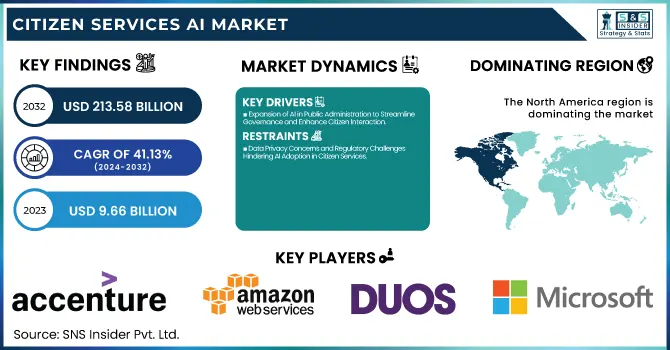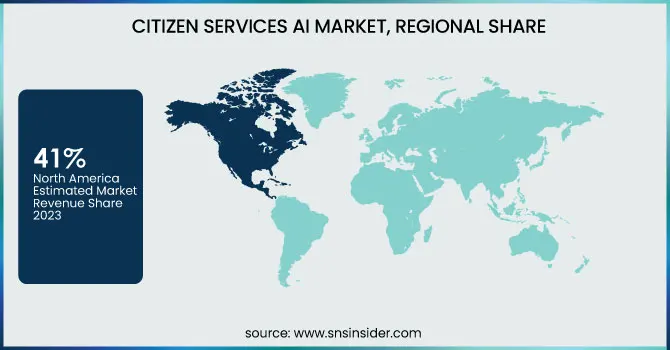Citizen Services AI Market Report Scope & Overview:
The Citizen Services AI Market was valued at USD 9.66 billion in 2023 and is expected to reach USD 213.58 billion by 2032, growing at a CAGR of 41.13% from 2024-2032. This report includes an in-depth analysis of several factors that affect market growth, such as adoption levels, use patterns, regulatory and compliance effect, and more. It also considers the cost savings and efficiency benefits created by AI solutions in citizen services, as well as their role in the drive for sustainability. As AI is being used more by governments and public organizations to streamline services, enhance customers' experiences, and accelerate innovation, the market will witness huge growth, and there will be a more effective and efficient public sector.

To Get more information on Citizen Services AI Market - Request Free Sample Report
Citizen Services AI Market Dynamics
Drivers
-
Expansion of AI in Public Administration to Streamline Governance and Enhance Citizen Interaction
Governments worldwide are leveraging AI to transform public services, enhance efficiency in operations, and improve interaction with citizens. Through the incorporation of AI-driven automation, predictive analytics, and chatbots, administrative functions are becoming more efficient and quicker, minimizing manual workloads and operational expenses. AI-based systems facilitate personalized citizen engagement, with faster response times and enhanced service delivery. AI also improves data-driven decision-making, maximizing resource allocation and policy enforcement. With digital transformation gaining momentum, AI implementation in governance facilitates transparent, efficient, and citizen-centric public service models. With mounting urbanization and smart city projects, the application of AI in governance is further growing, fueling long-term service accessibility, security, and overall administrative efficiency.
Restraints
-
Data Privacy Concerns and Regulatory Challenges Hindering AI Adoption in Citizen Services
Growing applications of AI in public services open important issues concerning data privacy, security, and ethical governance. Governments must ensure compliance with strict regulations while handling vast amounts of citizen data, which can slow AI adoption. Public skepticism about AI-driven decision-making, potential biases, and job displacement further hinder widespread implementation. Additionally, high initial investment costs, integration complexities with legacy systems, and a lack of skilled AI professionals create operational barriers. Resistance to change within public sector organizations also limits AI-driven transformation. Achieving these challenges through sound policies, open AI governance, and directed investments will be essential for realizing the potential of AI in serving citizens.
Opportunities
-
AI-Powered Smart Cities Transforming Urban Management, Enhancing Public Safety, and Optimizing Infrastructure Development
The accelerating urbanization of cities is forcing the need for smart, technology-based solutions to optimize resources. AI is transforming urban planning by facilitating real-time traffic management, energy optimization, and public safety through predictive analytics and automatic surveillance. Governments are using AI-driven data analysis to enhance emergency response systems, minimize congestion, and optimize waste management. AI-based smart grids and infrastructure monitoring guarantee sustainable urban growth, minimizing operational expenses and improving service delivery. As cities become increasingly connected, the contribution of AI in governing cities keeps growing, enhancing the standard of living for citizens and encouraging economic development through efficient, technology-based public administration.
Challenges
-
High AI Implementation Costs and Maintenance Expenses Slowing Adoption in Public Services, Creating Financial Burden for Governments and Agencies.
Implementing AI-driven solutions in citizen services requires substantial financial investment, making adoption difficult for many governments. The expense of AI infrastructure, data centers, sophisticated software, and qualified professionals imposes a budgetary burden, especially on developing economies. Regular maintenance, system upgrades, and cybersecurity practices also incur additional long-term costs. Budget limitations and resource competition in public administration, most often, impede AI projects, restricting the progress of digital transition. Moreover, making an effective AI strategy without compromising on service efficiency is a top priority for government agencies. Breaking these monetary barriers involves strategic financing, private-public partnerships, and cost-saving AI models scalable enough to manage expenses without impacting the quality of service.
Citizen Services AI Market Segment Analysis
By Component
The Solution segment dominated the Citizen Services AI Market with a 63% share of revenue in 2023 as a result of the increasing need for AI-based platforms to boost public service efficiency. Governments are investing in AI-enabled software for predictive analytics, automation, and instant decision-making. These solutions enhance administrative processes, citizen participation, and data security. AI-driven chatbots, fraud detection tools, and smart governance platforms are extensively used, guaranteeing cost savings and operational efficiency, making the Solution segment dominate this market.
The Services segment is expected to grow at the fastest CAGR of 42.87% during 2024-2032, driven by the growing demand for AI implementation, integration, and maintenance services. Governments need skilled consulting, system upgrades, and training to maximize AI-powered public services. The intricacy of AI adoption in legacy systems propels managed and professional services demand. Furthermore, the growth of AI-as-a-Service (AIaaS) models supports scalable and affordable deployment, boosting growth in this segment.
By Deployment
The Cloud segment led the Citizen Services AI Market with a 59% revenue share in 2023 because of its scalability, affordability, and ease of deployment. Governments are increasingly turning to cloud-based AI solutions to improve flexibility, automate processes, and lower infrastructure expenses. Cloud platforms support real-time data processing, remote access, and smooth integration with existing systems. In addition, rapid deployment is enabled through developments in AI-as-a-Service (AIaaS) models, and robust security architectures guarantee data safety, thereby propelling the market for cloud-based offerings to greater heights.
The On-premises segment is anticipated to expand at the fastest CAGR of 42.99% during 2024-2032 due to increased demand for better security, compliance, and management of AI infrastructure. Government organizations dealing with sensitive citizen information favor on-premise AI solutions to minimize cybersecurity threats and maintain compliance with regulations. Customized deployment needs, integration with legacy systems, and minimizing reliance on third-party cloud vendors also speed up adoption. Progress in high-performance computing is also increasing the efficiency and scalability of on-premise AI implementations.
By Application
The Government & Public Sector segment led the Citizen Services AI Market with a 31% revenue share in 2023 because of the growing adoption of AI-based automation, digital governance, and data-driven policy-making. Governments across the globe are using AI for smart cities, fraud prevention, public safety, and citizen participation. Chatbots powered by AI, predictive analytics, and automated workflows increase the efficiency of services while minimizing operational expenses. Emphasis on enhancing administrative transparency, security, and real-time decision-making also reinforces the supremacy of this segment.
The Healthcare segment is expected to grow at the fastest CAGR of 43.30% during 2024-2032, boosted by the widespread use of AI in patient treatment, diagnostics, and resource planning. Predictive analytics with the help of AI identifies diseases in their early stages, while hospital processes are made more efficient by automation. Governments are investing in AI-based healthcare initiatives to enhance public health surveillance, telemedicine, and medical research. The increased need for AI in personalized medicine and effective data management drives growth in this sector.
By Technology
The Machine Learning segment led the Citizen Services AI Market with a 38% revenue contribution in 2023 because it is used broadly in predictive analysis, automation, and decision-making processes. Governments apply machine learning algorithms to detect fraud, manage traffic, and engage with citizens. Its capacity to handle large datasets, recognize patterns, and enhance the efficiency of public services is propelling adoption. Machine learning also increases AI-based applications in healthcare, security, and intelligent governance, positioning it as the market leader in this space.
Face Recognition is anticipated to grow the fastest CAGR of 44.45% over 2024-2032 due to mounting adoption in surveillance, security, and identity check. Governments worldwide are embracing artificial intelligence-based face recognition for identity management, digital identities, border control, as well as enhancing public safety. Increased fraud detection anxiety and gaining access to governmental services securely complement the demand as well. Technological breakthroughs in deep learning and biometric technologies improve precision, driving quick uptake in law enforcement, smart city initiatives, and citizen authentication systems.
Regional Analysis
North America led the Citizen Services AI Market with a 41% revenue share in 2023 because of its robust technological ecosystem, heavy government spending on AI-based public services, and early embracement of smart governance policies. The availability of top AI players, large-scale R&D processes, and a well-developed regulatory environment further compliment the use of AI in public administration. AI deployments in law enforcement, healthcare, and smart cities are extensively used, promoting regional leadership and increasing efficiency in citizen services.
Asia Pacific will expand at the fastest CAGR of 43.32% during 2024-2032, with strong digital transformation, rising smart city initiatives, and government investment in AI-based governance. Region nations are utilizing AI for city planning, public safety, and citizen participation. The increasing application of AI in healthcare and security and an expanding population that needs effective public services drive adoption. Development of AI studies and growing cooperation between tech companies and governments also boost market development.

Get Customized Report as per Your Business Requirement - Enquiry Now
Key Players
-
Accenture (Accenture AI, myConcerto)
-
Amazon Web Services (AWS) (Amazon SageMaker, AWS Lambda)
-
DUOS Living, Inc. (DUOS Smart Home, DUOS AI Assistant)
-
Google LLC (Google Cloud AI, Google Assistant)
-
International Business Machines Corporation (IBM) (IBM Watson, IBM Cloud Pak for Data)
-
Microsoft (Azure AI, Microsoft Power BI)
-
Oracle Corporation (Oracle Cloud AI, Oracle Autonomous Database)
-
Palantir Technologies (Palantir Foundry, Palantir Gotham)
-
Salesforce, Inc. (Salesforce Einstein, Salesforce Service Cloud)
-
SAP SE (SAP Leonardo, SAP S/4HANA)
-
ServiceNow (ServiceNow ITSM, ServiceNow Virtual Agent)
-
NVIDIA (NVIDIA AI Enterprise, NVIDIA DGX Systems)
-
Intel (Intel AI, Intel Nauta)
-
Alfresco (Alfresco Digital Business Platform, Alfresco Process Services)
-
Waymo (Waymo Driver, Waymo Via)
-
Voyager Labs (Voyager AI, Voyager Analytics)
-
Alibaba (Alibaba Cloud AI, DAMO Academy)
-
Tencent (Tencent AI Lab, WeChat AI)
-
Pegasystems (Pega AI, Pega Platform)
-
Baidu (Baidu AI, Apollo Autonomous Driving)
-
Automation Anywhere (Automation Anywhere RPA, Automation Anywhere AI)
-
OpenText (OpenText Magellan, OpenText AI)
-
H2O.AI (H2O.ai Driverless AI, H2O.ai AI Cloud)
Recent Developments:
-
In 2024, Salesforce introduced AI-powered tools like Einstein Copilot and Agentforce, enhancing automation in customer service, healthcare, and marketing. These advancements aim to streamline citizen interactions with AI-driven services.
-
At SAP TechEd 2024, SAP unveiled major Generative AI innovations aimed at simplifying complex processes, enhancing customization, and deeply integrating AI into enterprise applications, driving digital transformation.
| Report Attributes | Details |
|---|---|
| Market Size in 2023 | USD 9.66 Billion |
| Market Size by 2032 | USD 213.58 Billion |
| CAGR | CAGR of 41.13% From 2024 to 2032 |
| Base Year | 2023 |
| Forecast Period | 2024-2032 |
| Historical Data | 2020-2022 |
| Report Scope & Coverage | Market Size, Segments Analysis, Competitive Landscape, Regional Analysis, DROC & SWOT Analysis, Forecast Outlook |
| Key Segments | • By Component (Solution, Services) • By Technology (Machine Learning, Natural Language Processing, Image Processing, Face Recognition, Others) • By Deployment (Cloud, On-premises) • By Application (Healthcare, Transportation, Government & Public Sector, Energy & Utility, Others) |
| Regional Analysis/Coverage | North America (US, Canada, Mexico), Europe (Eastern Europe [Poland, Romania, Hungary, Turkey, Rest of Eastern Europe] Western Europe] Germany, France, UK, Italy, Spain, Netherlands, Switzerland, Austria, Rest of Western Europe]), Asia Pacific (China, India, Japan, South Korea, Vietnam, Singapore, Australia, Rest of Asia Pacific), Middle East & Africa (Middle East [UAE, Egypt, Saudi Arabia, Qatar, Rest of Middle East], Africa [Nigeria, South Africa, Rest of Africa], Latin America (Brazil, Argentina, Colombia, Rest of Latin America) |
| Company Profiles | Accenture, Amazon Web Services (AWS), DUOS Living, Inc., Google LLC, International Business Machines Corporation (IBM), Microsoft, Oracle Corporation, Palantir Technologies, Salesforce, Inc., SAP SE, ServiceNow, NVIDIA, Intel, Alfresco, Waymo, Voyager Labs, Alibaba, Tencent, Pegasystems, Baidu, Automation Anywhere, OpenText, H2O.AI |

